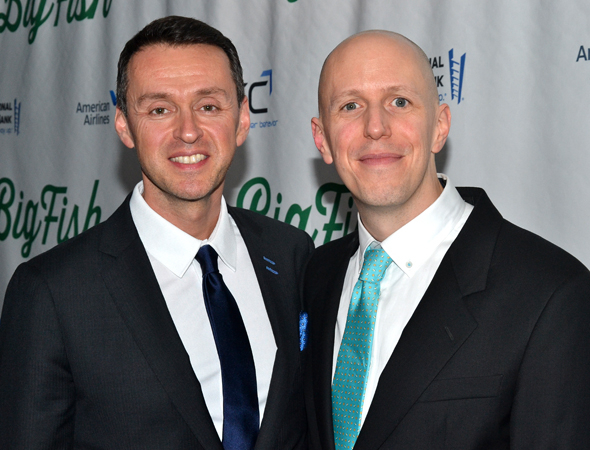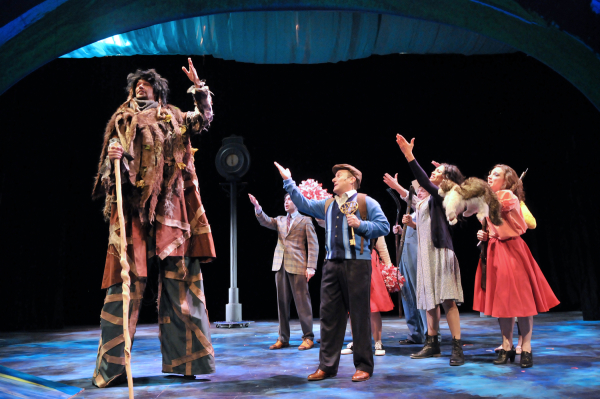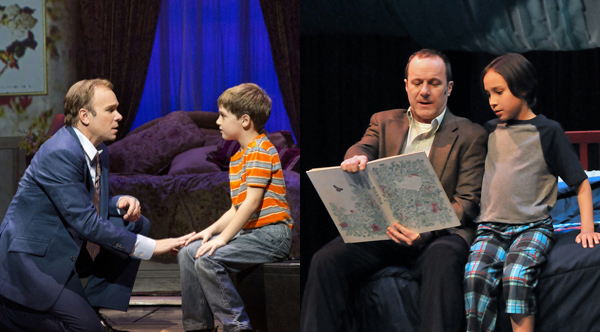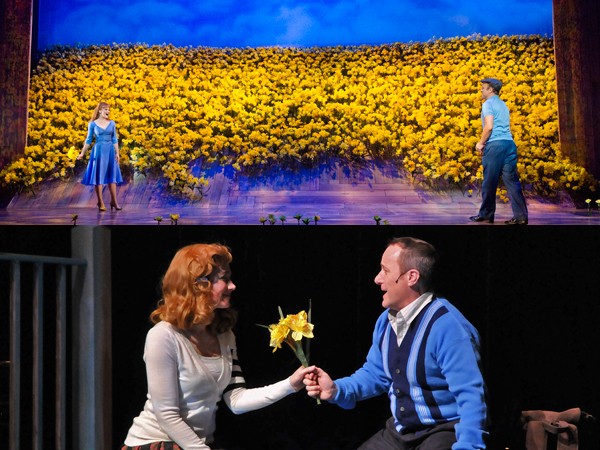Andrew Lippa and John August Adapt Broadway's Big Fish for Smaller Ponds
When composer Andrew Lippa and book writer John August brought their stage adaptation of Big Fish to Broadway in 2013, they arrived with a spectacular group of musical-theater magicians. Five-time Tony winner Susan Stroman lent the piece her showstopping choreography, six-time Tony winner William Ivey Long crafted a collection of ornate costumes for the 21-member ensemble, and Tony-nominated set designer Julian Crouch built towering structures that did justice to the story's grand title.
Now that the show is hitting the regional circuit — traveling to theaters with only modest accommodations (in comparison to Broadway's Neil Simon Theatre) — Lippa and August have returned to their collaborative labor of love at Boston's SpeakEasy Stage Company to pare down the production for a cast of twelve. As they wrapped their Beantown rehearsals, TheaterMania chatted with the two writing partners to discuss this creative overhaul. Production numbers have been removed and characters have been condensed, but in many ways, as both men agree, the show is as Big (Fish) as ever.

(© David Gordon)
What made the two of you decide to rework Big Fish for this smaller ensemble production?
John August: The process of getting a musical up in the first place involves so many steps. It started with me and Andrew at the piano, and then it scaled up to a twenty-nine-hour reading at music stands and a little workshop version, and finally the big version. As we were working through this whole thing, Andrew and I got to see it in a really small intimate setting and we really enjoyed seeing the show that way. Even during the big version we always talked about how much we enjoyed the smaller version. This is just an opportunity to look at what the show would be like with a smaller cast and in a smaller space.
Andrew Lippa: The other thing is that lots of people want to do Big Fish. We have almost a hundred licenses coming up this year. That's a really big number and we're trying to make that number bigger, and one of the ways to make that number bigger is to make the show available to everybody who might want to produce it. There are thousands and thousands of places that can't support the size show we did on Broadway with twenty-one actors and fourteen musicians. So we're getting the opportunity here in Boston to create not only a revised version of the show but a cut-down version of the show that allows it to be done with twelve actors and six musicians. We're going to make that version available to many theaters who would like to produce our show.
Have you found that the show lends itself well to a smaller space?
Andrew: We have a hunch after seeing it in the rehearsal room that it actually is a wonderful second version of the show. [It] engages the audience's imagination in a way that we always imagined the show could and would. It's [like] if you show them a sock and say, "This is a hot air balloon," as long as the characters believe that the sock is a hot air balloon, the audience can get on board as well.
John: Theater has the tremendous ability to allow us to suspend our disbelief, and this just pushes that a little bit further.
For people who saw the Broadway production, what are the biggest differences between that version and this new one?

(© Craig Bailey)
John: It's really much more of an ensemble group piece than it was on Broadway.
Andrew: Yeah. [The Broadway production] was more of a star vehicle with a really big role at the center of this piece in Edward Bloom. He's still the leading character, but because it's twelve people and they play multiple roles, they take a larger amount of attention. They are sort of the troupe of actors in Edward Bloom's imagination who help tell his story. So there's much more of an ensemble quality to this piece now, much to its improvement. There are [also] four songs from the Broadway show that we've excised in favor of two quote-unquote "new" ones ("This River Between Us" and "Magic in the Man"). We recorded those two songs as bonus tracks for the original cast recording, and they have found their way back into the show, and we're very happy with how they're working. We also cut a big number that used to open Act 2 — a giant Susan Stroman dance number called "Red, White and True." You just can't do that with twelve people. It just would be silly and it wouldn't have any impact.
Did you approach the revisions together or attack the book and score separately?
Andrew: John and I always approached this as a team. Our notion is that we're two minds becoming one. We've worked together for ten years now, and John and I forced ourselves very early on to feel comfortable with each other's criticisms so that we could make each other better and keep pushing each other. That's one of the things I value most about working with John, and I think because of that I've written a much better show than I might have otherwise. It's really clear John wrote the book to the musical and I wrote the score, but at the same time, the way we think about how we created the show, we both feel like we wrote everything.

(© Paul Kolnik/Craig Bailey)
John: Absolutely. The show started out with me and Andrew performing all the characters so we know them very innately. Figuring out this new version was really a matter of, how do we scale up from this two-man show that was always in us and grow it out? "This River Between Us" was one of the very first songs we worked on for the show, and the way that it found its way back into this version is because of [that] process.
Andrew: John just said when we wrote the song "This River Between Us." And we did. We talked about it, we figured out what it might be, and we figured out how to make it work in the play with the characters. Then I go sit at a piano and write a song and John goes and writes a scene and then we come back together to figure out how these voices become one. There's a wonderful joy when you find a collaborator like that and you can make a piece that feels like it was written by one person.
Does it feel almost like building a new show from scratch?
John: I've been writing some version of Big Fish for the past fifteen years and there's a fundamental DNA to Big Fish. You can plant it in fertile soil and it will grow into what Big Fish wants to be, which is a story of a father and son, of mortality, and fatherhood. This was just a chance to find the right size pot for it so it could grow into a really beautiful show for these smaller theaters. So it did feel new but it's always felt familiar. If we needed to set it in a space as a ballet there's probably still a version of Big Fish that we could tell.
Andrew: I haven't fallen out of love with these characters and I haven't fallen out of love with telling this story. We started writing this at the end of 2004, and it took that long to develop and get to Broadway. So we're here ten years on and still working on a version of Big Fish. [laughs] But in some ways it's kind of wonderful. It's like a family member who comes back to visit for a while and you see they've aged a little bit and you react to the them a little differently but you still love them.

(© Paul Kolnik/Craig Bailey)











